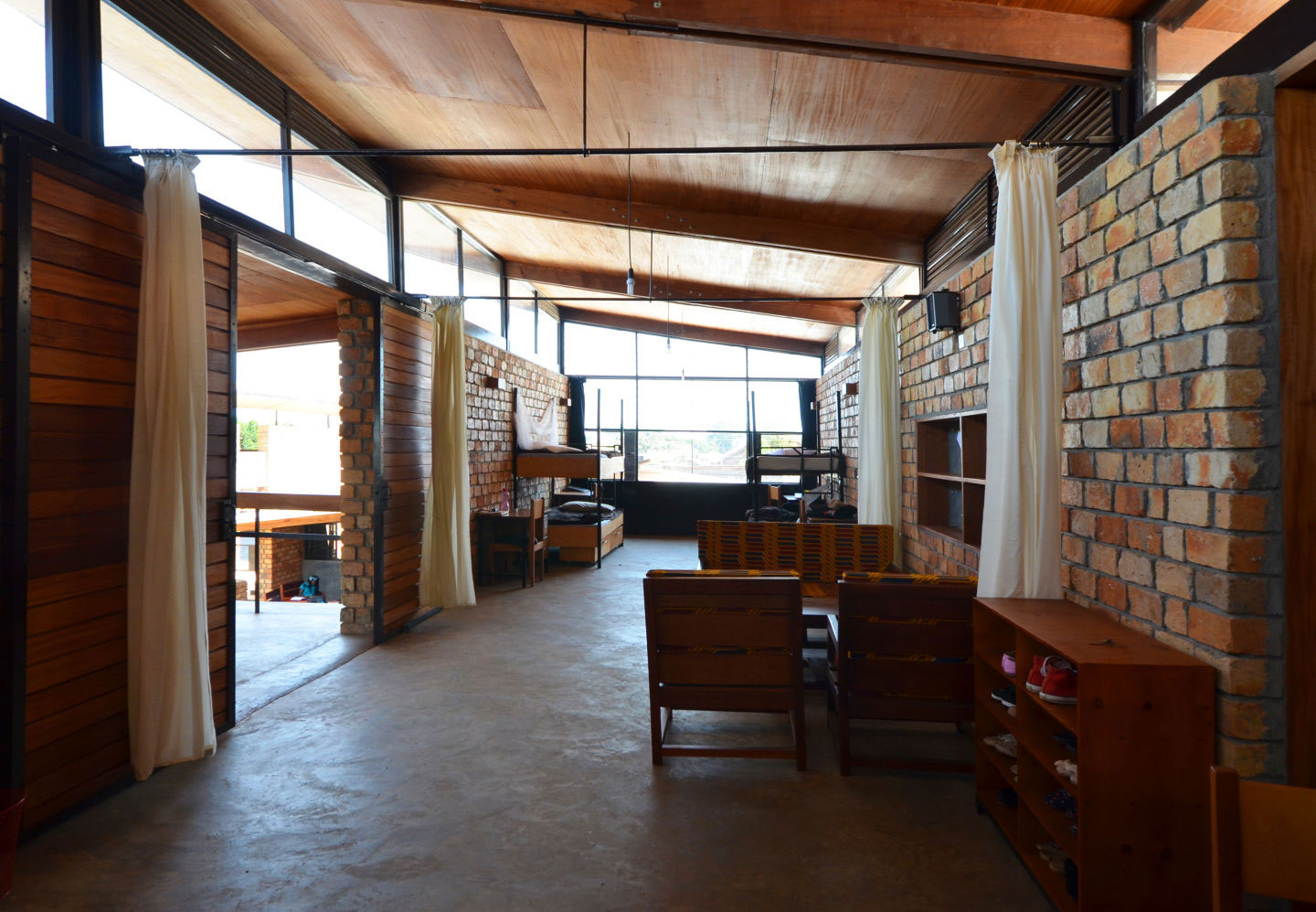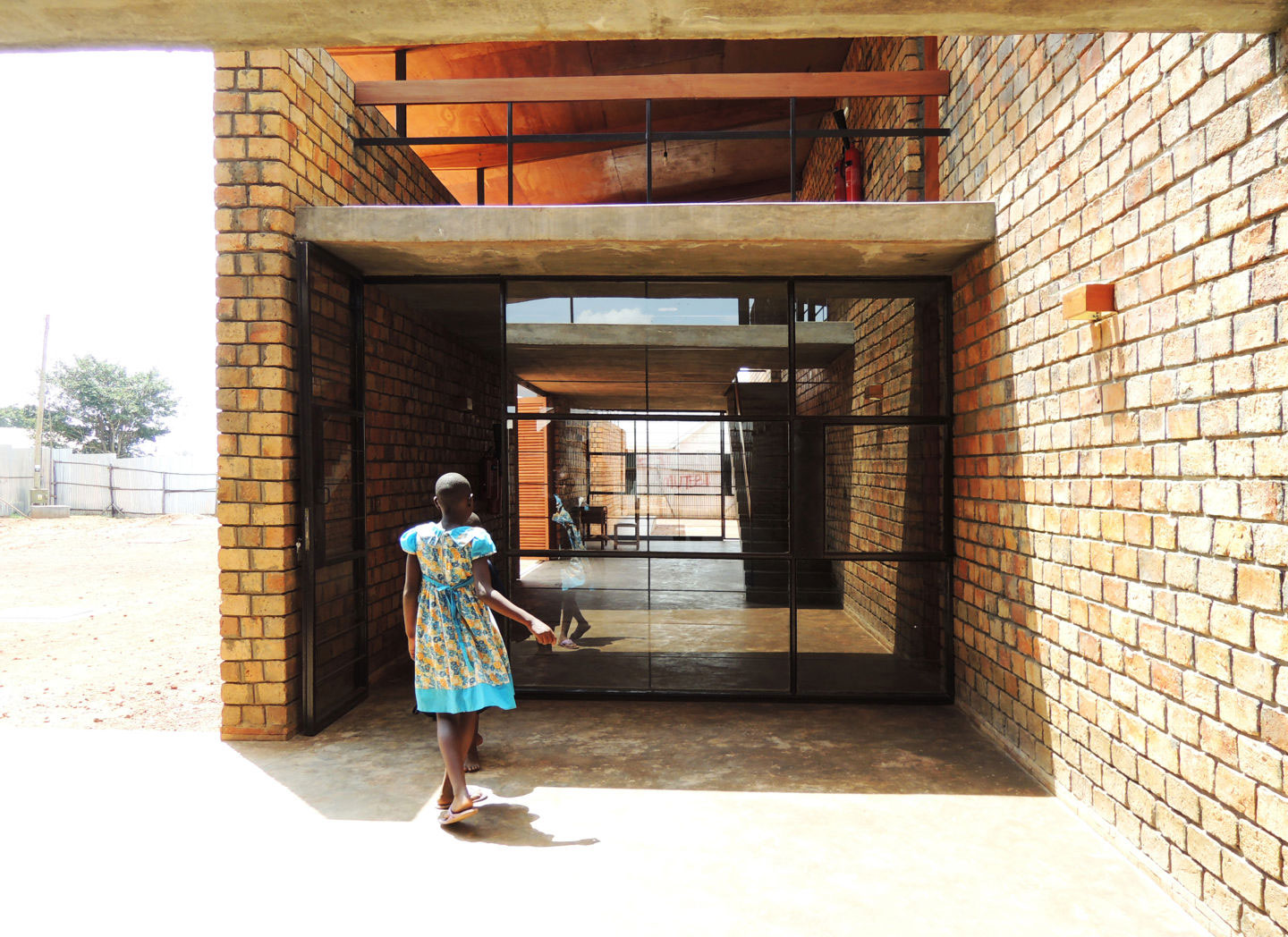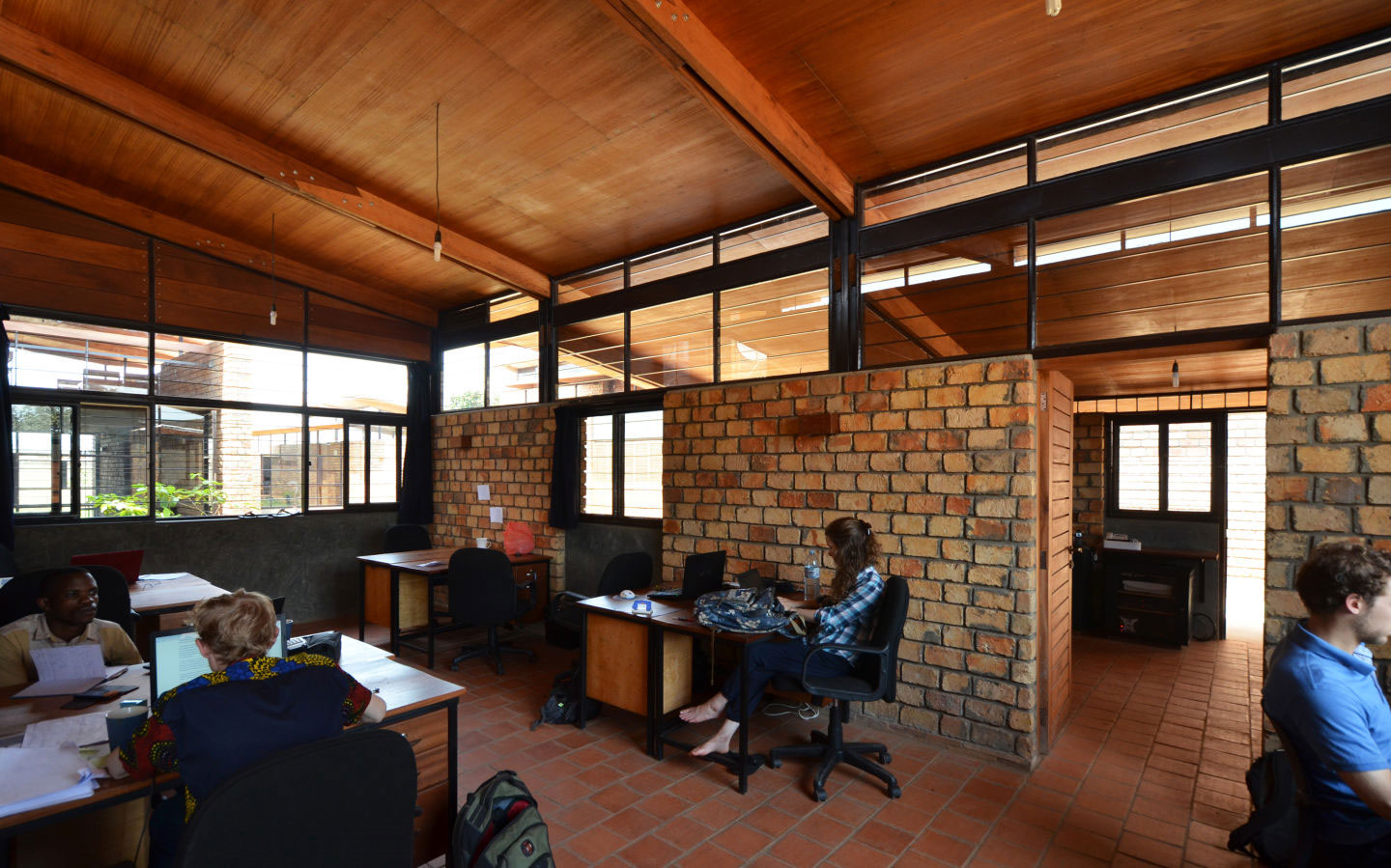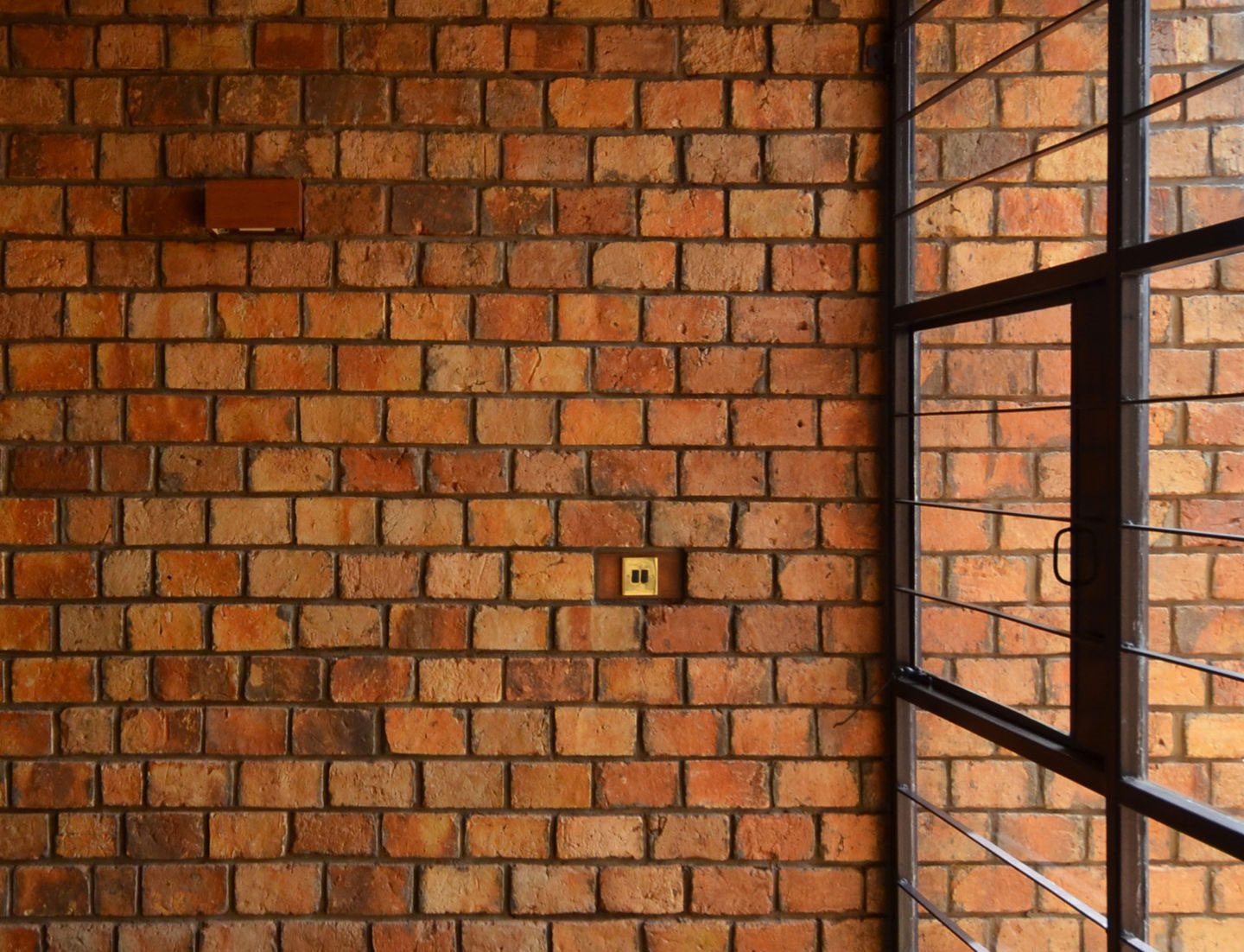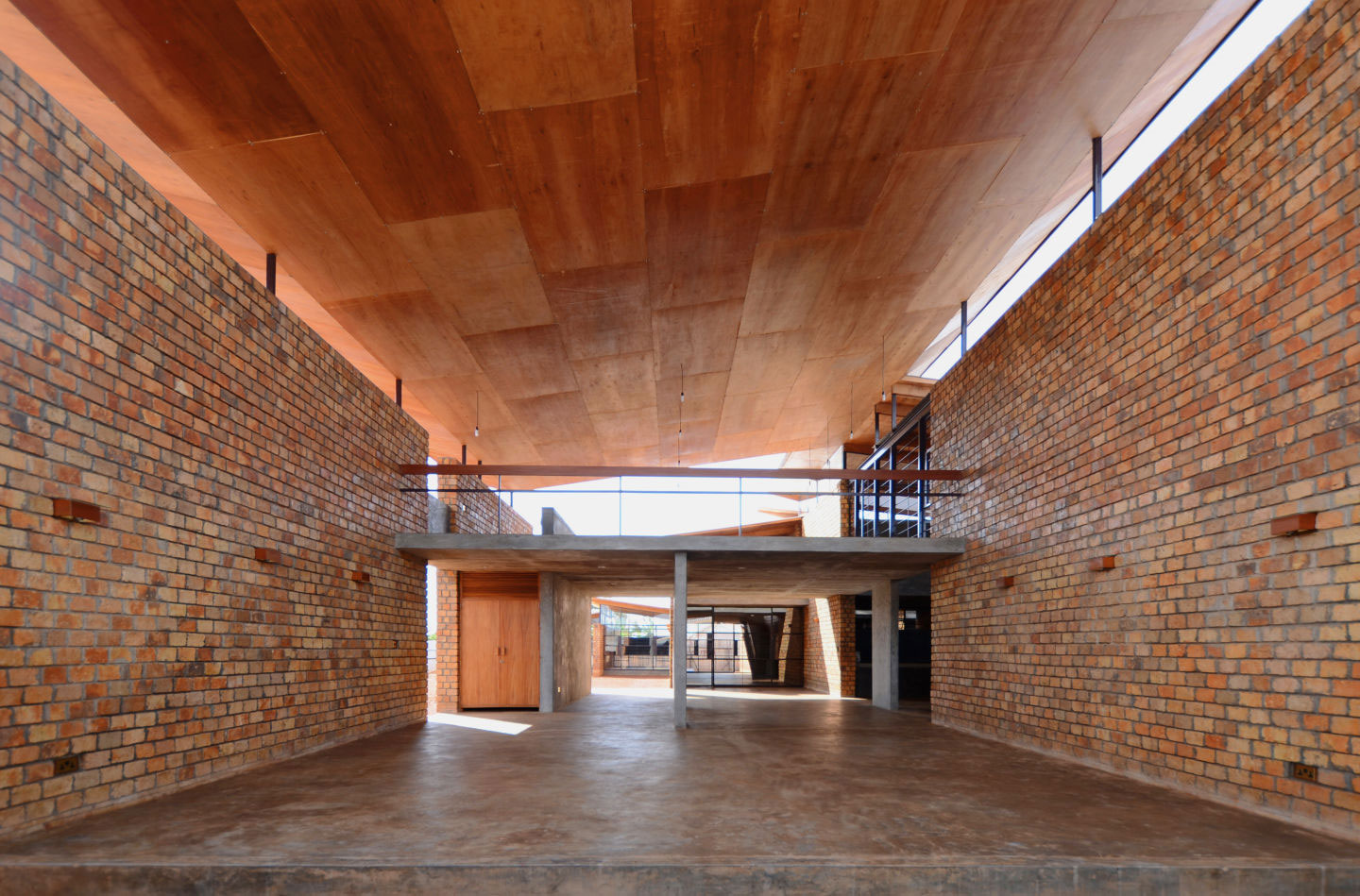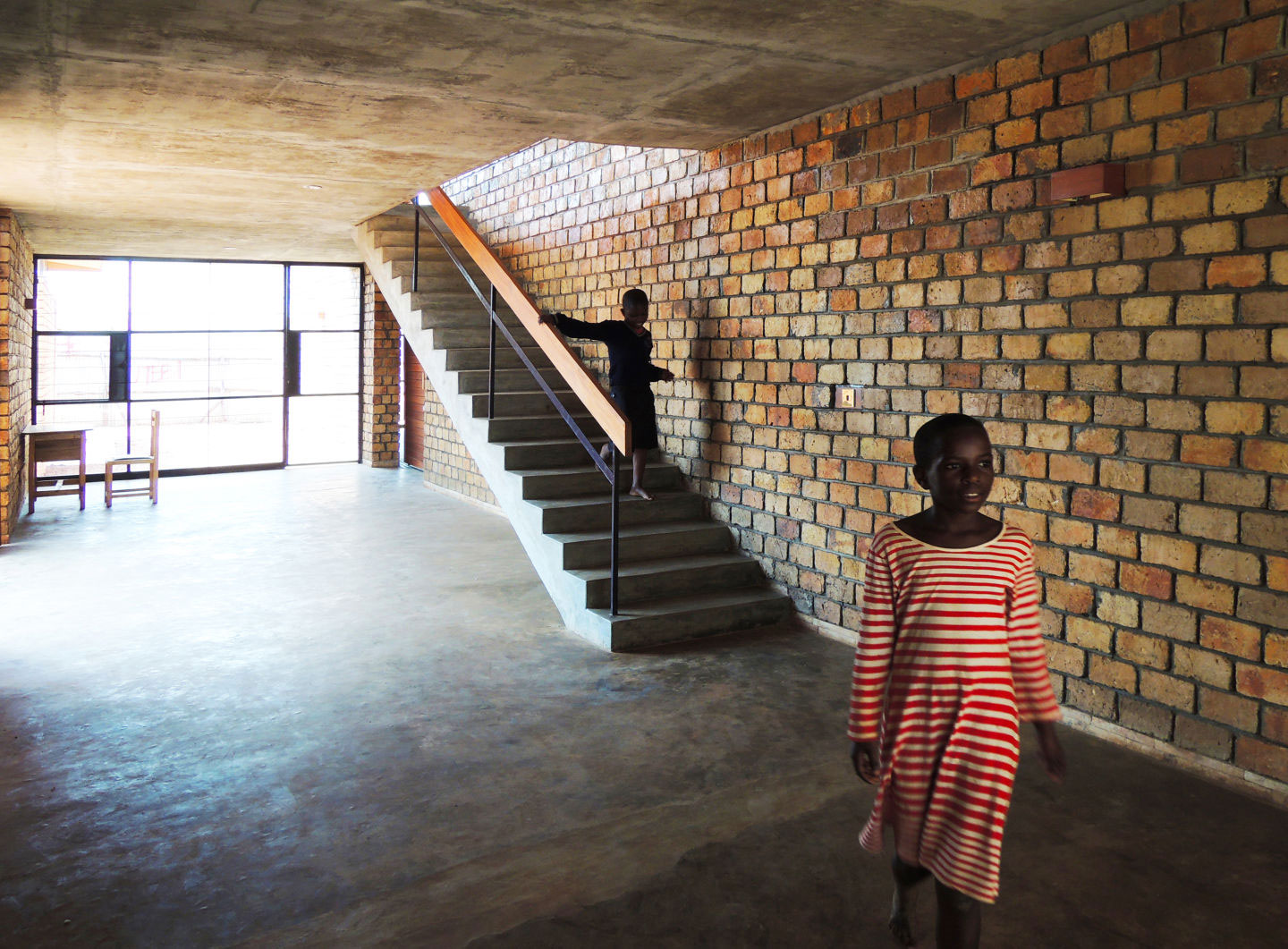-
AU Dormitory / Terrain Architects
Architects:
Terrain Architects
Location: Wakiso District ,Uganda
Uganda
Project Team: Ikko Kobayashi, Fumi Kashimura
Interior Décor: Terrain Architetcs
Project Year: 2015
Photographer: Baptiste François, TERRAIN architects
Website: www.terrain-arch.com
Use: dormitory (firing bricks + reinforced concrete two-story)
Design Cooperation: Plantek Consultants (Uganda)
Construction: Aswangah Construction Services (Uganda)
Mural: Mari Minato
Total floor area: 663sqm (1st phase = 739.72 meters)
-
- 03 April 2016

- Datum Editorial
- Architecture , Residential , Editor's Choice , Education Centres ,
From the Architects:
The dormitory for students from various countries in Sub-Saharan Africa is located in Uganda. Right on the equator and high above sea level, it offers a comfortable climate, so walls lie in east and west side to keep sunlight out and windows lie in south and north side to bring light and wind into rooms. In order to maximize local builders’ technique and character of local materials, it used local bricks and timber as main materials in a simple composition. AU dormitory is an educational and learning institution for African students who will be prepared for further education in other international institutions.

The site is located in “Yesu Amala” a residential area within Nansana town, Wakiso District about 100m off Hoima road and half an hour drive from Kampala City. The facility is closer to the bypass therefore very accessible with a good view towards west because of its hilly location. The site which is Approx. 2000 ㎡ big and in a trapezoid shape is surrounded by roads in its three sides, calm residents, a local primary school and the community church. Those are mainly single-story buildings, but because of population growth in recent years, higher buildings have appeared closer to the site.

The concept comprises two storied buildings (the boys’ and girls’ dormitories) and two other bungalows (administration and lecture room blocks) all rectangular in shape and randomly place to circle a courtyard. The conference/main hall and canteen/kitchen are all attached to the boys’ dormitory whereas the staff/matron rooms are attached to the girls’ dormitory.

A power/generator house, pit latrine and gatehouse attached to the main gate have also been provided. The nature of the surrounding facilities and rotational programs for students/users is a tedious process to implement and monitor. This has however not been forgotten and has been the rationale behind the rectangular shapes in design of the structures to provided easiness while operationalizing the facility.

Each rectangular building has been provided with very wide windows on its north and south sides, having walls on its east and west sides, such that sufficient natural sun light, brightness and aeration can be adequately accessed without heat load by sunlight. Big and small outside spaces have also been provided to offer green, wind and natural light among others to create a conductive atmosphere for users and for a single reading space.

One of the featured material of this building is local bricks, which are gathered some places near the site. Well burnt clay bricks are major materials for all buildings in Uganda, but because of their uneven shapes and colors, they are usually covered by mortar and paint. In this project, bricks used are exposed and properly structured with reinforced concrete pillars and beams to offer beautiful colors. Iron sheets are used for roofing, withhardwood timber rafters and plywood ceilings. Because of its high sea level, it is hot in daytime but cold at night throughout a year, this roof structure has been properly insulated to offer a comfortable and conducive atmosphere for the users. Rainwater collection and harvesting systems have been also set up in 2nd phase.
SHARE YOUR THOUGHTS
-
If you want your own avatar and keep track of your discussions with the community, sign up to archiDATUM >>
SELECTED WORKS
-

The Port Sudan Pediatric center is essentially a link, one that ties the elements of purpose in medicine via vis aspects of freedom. Free...
-

- Dyeji Building / Costalopes
- 30 Jan 2017
The Dyeji Building is part of the Bay of Luanda Parcel 3 development scheme located at the narrowest part of the Ilha do Cabo promontory....
-

- BMCE Branches / Foster + Partners
- 23 Apr 2015
The BMCE (Banque Marocaine du Commerce Exterieur) Headquarters in Rabat, Morocco by Foster+Partners which opened in March 2011 is one of ...
CONTEMPORARY AFRICAN DIRECTORY
-

- 1:54 Contemporary African Art Fair
- 29 Jun 2015
A reference to fifty-four countries that constitute the African continent, the title of 1:54 establishes the parameters of the fair’s eth...
-

The Royal Mansour is the result of pure inspiration: a dream made real, and a spectacular recreation of a beautiful way of life. The very...
-

- Malabo Basilica / Saraiva-Associados
- 25 Aug 2015
The project for Malabo Basilica conveys values such as strength, serenity, austerity and tranquility. The rectangular shaped building e...
ARCHIDATUM BROWSER
-
-
-
category
Africana Apartments archiDATUM Audio ArchiDATUM Dates archiDATUM Jobs archiDATUM News archiDATUM Talks ArchitectsArchitects + Spaces Architecture Art Articles Books & Magazines Books & Magazines Centres City Planning CommercialCommercial Centres Communal Centres Competitions Conservation Conservation Architecture Contemporary Contemporary African Directory Editor's ChoiceEducation Centres Events Faculty Years Financial Gated Communities Health Centres Hotels Human AnatomyTechnology Traditional Training Transit Oriented Urban Urban Architecture Videos Weekly Round Up: Architecture in AfricaTaxi Ranks Obituary African Greats Concept Store Lifestyle Luxury Stores African Modernity Ideas of InterestAfrican Modernism Pritzker Prize Makers of a Continent Spotlight Pancho Guedes Pin Up Architectural Photography LensSwahili Architecture Contemporary Swahili Women In Architecture Parliaments Exhibition Houses ArchiDiaries Great City Terrible Place -
POPULAR
Datum Antique: Sasaki Associates’ Green Lung of... Falatow Jigisayo Orphanage / F8 Architecture + ... Mapungubwe Interpretation Centre / Peter Rich A...Eko Atlantic City / AR+H Architects House 12 Magnolia Hills / Mehraz Ehsani Msafiri Mwazighe And The White Fields Of Sustai... International Conference Center / CAAU ArchitectsCentre de Santé et de Promotion Sociale/ Kéré A... Dennis Mukuba And The Unbowed Hues of Justice: ... Dakar's International Conference Center / Taban... TechU Ibadan campus / MZ ArchitectsTena Tower-Tena Lakes/ Manuelle Gautrand Nigerian Cultural Centre and Millenium Tower / ... 10 Greenest Buildings in Africa AFGRI Headquarters Office Building/ Paragon Arc...Halawa House / Abdel Wahed El-Wakil Bibliotheca Alexandrina / Snøhetta Mankgaile Limpopo Primary School/ SAOTA Tripoli Convention Centre/ Tabanlıoğlu ArchitectsLagos State Considers ‘Makoko Floating School’ ... Marrakech-Menara Airport Extension/ E2A Archite... US Embassy Maputo/ Allied Works Architecture Dar es Salaam: An Emerging African MetropolisBlock 36, Westown / Shahira H. Fahmy Architects Grand Théatre de Rabat / Zaha Hadid Architects ZHA ArchiDATUM Dates: Issa Diabaté on a Political A... English Point Marina/ Broadway Malyan ArchitectsLibyan European Hospital /Carlo Berarducci Arch... Glover 57 Apartments / Domaine Public Architects National Park of Mali / Kere Architecture George Yagomba And A Sail Across Diplomacy: Par...Botswana Innovation Hub/ SHoP Architects Mayotte Airport / REC Architecture Goma Catholic Cathedral/ Lexicon + Ion Architects National Theater of Equatorial Guinea / Indepen...Mopti Centre For Earth Architecture / Kere Arch... ArchiDATUM Dates: SAOTA's Greg Truen On Modern ... Kwame Nkrumah Presidential Library/ Mario Cucin... Why Abandon The Mud Hut: Joe Osae-Addo and affi...Universidade Agostinho Neto / Perkins + Will Ar... The CAD Enigma: The Backlash Within Architectur... Windmills Chapel / Koop Design Don Bosco Catholic Church/ Space and Systems Ar...The Technology School of Guelmim/ Saad El Kabb... Sinthian Thread Arts Cultural Centre / Toshiko ... Concrete Beauty: Towards an Architectural Language KE Ochieng/SAOTACollege Ouangani, Mayotte/ TERRENEUVE architects Sipopo Congress Center / Tabanlıoğlu Architects Casa Port Railway Station/ AREP Karura Forest Environmental Education Centre / ...Umubano Primary School/ MASS Design Great City Terrible Place: Future of Island Cities Alexandra Interpretation Centre / Peter Rich Ar... Benga Riverside Residential Community / Kere Ar...Warka Water/ Architecture and Vision - Arturo V... Glass House/ Nico Van Der Meulen Architects South African Embassy, Addis Ababa/ MMA Design ... Blair Atholl House / Nico Van Der Meulen Archit...Opera Village Laongo/ Kéré Architecture Aloe Ridge House/ Metropole Architects Controversy Sells: In Defence of the One Finger... Gando Primary School / Kéré ArchitectureCalabar International Conference Center/ Hennin... Classrooms for University of Namibia/ Wasserfal... Head Office Ernst & Young / Wasserfall Munting ... Aveni-Re Building/ Koffi & Diabaté ArchitectesBMCE Branches / Foster + Partners Architecture of African Origin: Beyond the Dist... Kigali: A City’s Rebirth Into The 21st Century Constantine Exhibition Centre / PTW ArchitectsNIB Mixed Use / Xavier Vilalta Architects Ahmed Baba Institute of Higher Islamic Studies ... The Boma Hotel/ Morphosis Architects Soweto Theatre / AfritectsHouse Serengeti/Nico van der Meulen Dedan Kimathi Monument/ School of Fine Art, Ken... Kituo Cha Sheria/ Morphosis Architects FOCHTA Vocational Training Centre/Sam Crawford ...Baragwanath Transport Interchange and Traders M... Equatorial Guinea Ministry of Mines, Industry a... Butaro Doctor’s Housing/ MASS Design Group Ardhi University/ University of Dar es SalaamAbdel Wahed El-Wakil / The Benefits of Traditio... New British High Commission / Kilburn Nightinga... The Mauritius Commercial Bank Ebene / Jean Fran... Central Catering Unit/ Dalgliesh Marshall JohnsonTaroudant University / Saad El Kabbaj, Driss Ke... Ouagadougou International Airport / ENIA Archi... Rabat-Salé Urban Infrastructure Project, Hassan... New Rugo Social Housing / George Pericles Archi...Africa Needs Glass Architecture; Or Does It? 30 Jellicoe Avenue/ Paragon Architects El Gouna Hotel Resort / Michael Seagraves Archi... OVD 919/ SAOTAArchitecture Of African Origin (AOAO): Isn’t th... Villagio Vista / Allford Hall Monaghan Morris Great Mosque of Touba / Tashiko Mori Riviera Apartments / Domaine Public ArchitectsModern House: Slow Death of African Informal Se... The Teodoro Obiang Nguema Mbasogo Presidential ... Adeline Gruber on Translating the Man Made : An... Rwinkwavu Neonatal Intensive Care Unit / Mass D...Durban Beach Front Redevelopment / Design Works... Cove 3 – Pezula Knysna/ SAOTA French School Group Jean Mermoz / Terreneuve A... Film + Architecture: What it Holds for AfricaThe Taita Sustainable Vernacular House Mama Sarah Foundation School/Kere Architecture Butaro Hospital/ MASS Design Group Long Beach Resort / Stauch Vorster ArchitectsMaking Africa A Continent of Contemporary Design Jarred Pincus and the Fortress of Faith: Archit... AACCSA Headquarters / BC Architects WAF 2015 African Projects ShortlistThe Amphitheatre of El Jem/ The Roman Empire Green Buildings Sprouting Up in Nairobi, Kenya Mtamu Kililo and the Brick by Brick Battle in t... African Design Center; “Bauhaus of Africa”ArchiDATUM Dates: Joe Osae-Addo on Competition ... ArchiDATUM Dates: Paragon's Henning Rasmuss on ... Grand Mosque of Algiers / KSP Jürgen Engel Arch... University Campus Denis Sassou Nguesso/ IADCorner Jellicoe Avenue and Oxford Road / Parago... Old is-Gold Throwback: Photographic Chronology ... Catholic University Of East Africa Learning Res... Courtyard Houses / Jean-François ZevacoRegulation for Postal Communication Authority A... Jomo Kenyatta Statue/ James Butler French Diplomatic Campus in Nairobi/ TERRENEUVE... Hilton Hotel Windhoek/ Wasserfall Munting Archi...Abilonino Community Polytechnic/ Lexicon + Ion ... The Plight of African Vernacular Architecture Office of The Auditor General/ Wasserfall Munti... Old is-Gold Throwback: Photographic Chronology ...Art or Farce: Africa Renaissance Monument in Da... Protect African Heritage: Who Really Cares? Vaal Studio / Elphick Proome Architects New Algerian Parliament / Bureau Architecture M...School Brousse-Besely/ Jean-Paul Viguier & Asso... Joe Osae Addo on the Connecting Tissues of Resi... Johannesburg: The City of Gold Makoko Floating School/ NLÉUpeo Camp, Lake Jipe / Urko Sanchez Architects Confessions Of A Critic: Architecture The Lady 21° House at Msasani Village/ Tharani Associates Naomba, Naomba/ Nadir TharaniBritish Council Building /Emma Vergette Architectural Language: The Myths and The Reality 102 Rivonia Deloitte Head Office / Boogertman +... Circa Gallery on Jellicoe / studioMASThe Assinie-Mafia Catholic Church / Koffi & Dia... Who Cares For Non Showy Architecture? Autodesk Kenya Live Mzamomtsha Primary School/ SAOTAHamilton Fountain/ Judiciary Service Commission Bloomsbury Waterfront Development/ NLé Works Australian High Commission / Planning Systems S... Zliten Al-Asmariya University For Islamic Scien...Primary School Tanouan Ibi / LEVS Architecten Cove 6 – Pezula Knysna/ SAOTA Crafting Kenya: A Photographic Journey Of Kenya... Aga Khan Hospital MRI Radiology and Physiothera...Mutende II/ Orkidstudio Want to be a Starchitect? Come, Sit Down and Li... Archi Porn: The Soulless Playback That is Archi... Dr. Barrack Residence/ Heritage AssociatesGIfA Awards for Architecture 2015 Azur Pavilion/ Koffi & Diabaté Architectes Women's Centre/ Hollmén Reuter Sandman Architects Mohammed VI Football Academy/ Groupe 3 ArchitectesSarah De Villiers And The Fantastical Realm of ... Great City or Terrible Place: Experiencing Lamu SOS Children´s Village in Tadjourah / Urko Sanc... The Epping Road Long House/ Studio MASArchiDATUM Dates: Amyas Cornell and his Rebelli... Sandibe-Okavango Safari Lodge / Nicholas Plewma... Boogertman + Partners Architectural Design Scho... Embassy of the Netherlands / Dick Van Gameren a...Egypt inaugurates Museum of Arabic Calligraphy ... Urban Environment: Engaging Through Travel Datum Antique: Pancho Guedes' Saipal Bakery Evolution of Pedestrian Bridges/ Urban MorphologyWestcliff Estate/ Studio Mas Village Health Works Staff Housing / Louise Bra... Diébédo Francis Kéré: Architecture is a Wake-Up... Lalibela /BC ArchitectsHonoring Wangari Maathai: The Epitome of Sustai... Lokko House / Lesley Lokko Conservation of Architectural Heritage (CAH) Biovac Centre Phase 1 / Studio MasWorking Smarter: Architects and their Apps Woldaya Maternity Centre /Xavier Vilalta Archit... Musau Kimeu: The Philosophy of Environmental De... Mahali Mzuri Safari Camp / Real StudiosMaputo Modernism: A Rachel Jenkins' Photo Essay World Architecture Festival Awards 2015 US Department of State Bujumbura / Perkins and ... Rebel Architecture: On activism in Architecture...11 Irritating Things That Drive Designers Crazy African Wildlife Foundation Ilima School Mass D... Who Is The Architect For The Common Man? H.E. Amb. Martin Kimani on Architecture in AfricaAnidan Clinic/ Urko Sanchez Architects Of Cities & Urban Themes: A case of Zanzibar St... Netherlands Embassy in Mozambique / Kaan Archit... 105 Corlett Drive/Paragon ArchitectsDatum Antique: Giuseppe Pettazzi's Fiat Taglier... ArchiDATUM Dates: Joe Gitau on the Psychedelic ... Infill House / Studio Mas Highveld Pavilion / Studio MasArchitecture Students: Be Competitive Through T... ArchiDATUM Dates: Nikos Salingaros On A Sustain... UIA Road trip Caravan 2014/ Students under the ... Seth Mokitini Methodist Seminary / Boogertman +...Extension Labattoir College in Dzaoudzi/ Archit... Terra 2016: XIIth World Congress on Earthen Arc... Designing City Resilience Biennale Architettura 2014 - Absorbing Modernit...Significant Moments that Changed the African Ar... African Modernism: Architecture As a Nexus of D... Great City or Terrible Place: The Durban Experi... Working on Water: Al JazeeraArchitecture: From Nothing to Something The Lo-Fab Movement 2015 Campaign Meroe Royal Baths Protective Shelter / Kere Arc... Market in Quibala / Michelle Vasconcelos Design...St Jerome’s Children's Centre / Orkid Studio Malabo New St. Isabel International Airport / I... House Mosi/Nico van der Meulen AFRICA - The Architecture, Culture and Identity...Unified Architectural Theory: An Introduction ArchiDATUM Dates: Brad Pettitt and His Philosop... Diébédo Francis Kéré: How To Build With Clay...... ArchiDATUM Dates: Michael Khately and a Propens...Philip Kleijnhans' Architecture's Survival for ... Re-Imagining Nairobi: An Architectural Exhibition Buckminster Fuller Challenge 2015: Finalists An... Architecture for Social Gain Awards 2015 is Fin...Datum Antique: Jean Francois Lamoureux and Jean... 1:54 Contemporary African Art Fair Malabo Basilica / Saraiva-Associados Call for Proposals: Expo Milano 2015Centre pour le Bien-être des Femmes/ FARE Studio Visualizing the Future of the City/CAA Students... Everyone is an Accomplice/Nadir Tharani Library for the Community of Muyinga / BC Arch...Waiting for Your ‘Big Break’: My Two cents Pancho Guedes, A “Legend of African Modernism A... RIBA Norman Foster Travelling Scholarship Foster + Partners Ventures into Rwanda with a D...Roman Ridge / Alfredo Resende Architects Women’s Opportunity Center / Sharon Davis Design Brixton Studio House / 26'10 South Architects Offices for Bührmann & Partners / Wasserfall Mu...Taxi Rank No. 2 / 26'10 South Architects Alara Concept Store / Adjaye Associates The Last Glass House / Thomashoff + Partner Arc... Zeitz Museum of Contemporary Art Africa MOCAA /...The Cities of Cogo & Corisco Master Plans / Pag... Icons of a Modern Era: Five Premier African Art... African School of Excellence / Local Studio Politics and Architecture in Africa as Synonyms...British Council, Freetown / Manser Practice Africa Design Center: Training New Generation ... Koudougou Central Market / Swiss Agency for Dev... MNBH Museum of Earth Architecture_Sama and Kasa...British High Commission Tanzania / Manser Practice Maisha Film Garden / Tamassociati Vodafone Site Solution Innovation Centre SSIC /... Datum Antique: Hassan Fathy's New Barris VillageFreedom Park, Phase 1 / GAPP + Mashabane Rose A... Rosebank Lofts / 26’10 South Architects The Elemental Alehandro Aravena Scoops 2016 Pri... One Airport Square / Mario Cucinella ArchitectsFreedom Park Museum / GAPP + Mashabane Rose Arc... Dominican Chapel/ Demas Nwoko In Africa: Architecture Society of China_Part I Finding New Inspirations : Modernism Vs MimicryConcorde Kintélé Sports Complex/ PTW Architects Aon Insurance Headquarters / SPASM Design Archi... Alliance Franco-Senegalaise / Patrick Dujarric How Alehandro Aravena Beat Them All in 2016 : T...The Boogertman + Partners Architectural Design ... Konokono Vaccination and Educational Clinic / S... Datum Antique: Biermann and Theron's Crasulla ... The Outreach Foundation Community Centre / Loca...House Al Hamra / Atelier KOE Revival Sunset Chapel / FATmaison Cohabitation / Kilo Architectures Finding Stories :: The Role of Immaterial Cultu...AfriSam-SAIA Award 4 Sustainable Architecture 2... Move Over, Paul Klee: Pancho Guedes And My Guar... River House / 26'10 South Architects Lost Villa / Jonathan Woolf ArchitectsArchitecture Made In Africa: Unpublished Or Non... How To: The Appropriate Architectural Brief Goderich Surgical Center / TAMassociati Kaedi Regional Hospital / Association Pour Le D...Namibia Offices For Mineworker’s Union / Wasser... British Council Nigeria / Allies & Morrison Lake Muhazi Gahini Church / Light Earth Designs Architectural Sheng: The Good, the Bad and Outr...The Preschool of Aknaibich / BC Architects and ... Rwanda PIH Share Houses / Sharon Davis Design Port Sudan Pediatric Center, Red Sea State / Ta... Butaro Ambulatory Cancer Center/ MASS Design Group -
RECENT
-
ARCHIDATUM VIDEOS
-
MORE FROM Terrain Architects
EXHIBITIONS,EVENTS AND NEWS
-
OUR INSTAGRAM FEED
FROM OUR FLICKR FEED

- Tweets about archiDATUM
ARCHIDATUM ARCHIVES
RECENT NEWS AND EVENTS
OUR PARTNERS
All Rights Reserved .
All images are © relevant caption












